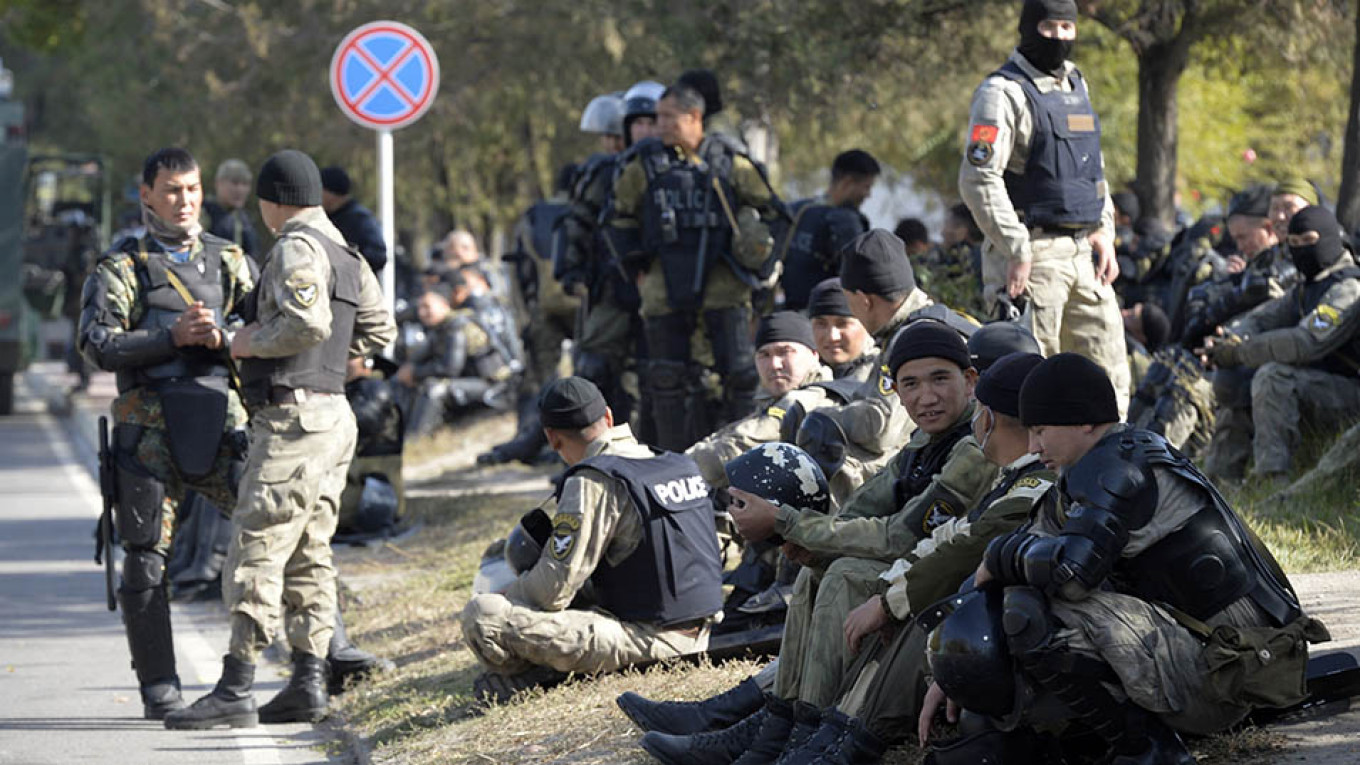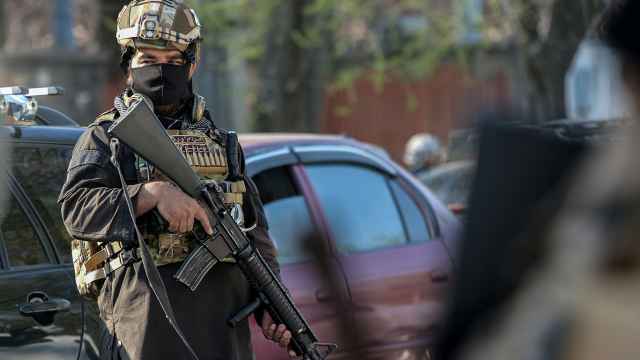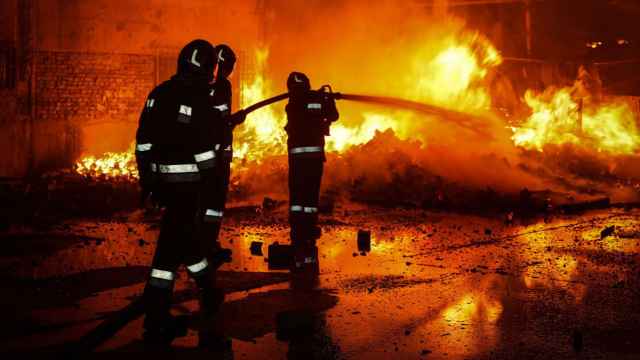Armed forces in Kyrgyzstan and Tajikistan have exchanged gunfire along a contested stretch of border, dramatically raising the stakes in a conflict that began with clashes among local residents.
Marufkhan Tulayev, deputy head of Kyrgyzstan’s southern Batken region, told Interfax news agency on April 29 that at least four Kyrgyz soldiers have been hospitalized with gunshot wounds.
“The situation on the Kyrgyz-Tajik border has got out of control. Gunfire is still ongoing at this time. Troops are shooting,” Tulayev was quoted as saying in a report published in the mid-afternoon.
Kyrgyz security services later said Tajik Interior Ministry troops were deploying mortars, machine guns and automatic rifles in the fighting.
The Tajik security services have also reported on the exchange of gunfire, accusing Kyrgyz troops of firing on Tajik border personnel near a strategically important irrigation water distribution facility.
Earlier in the day, Kyrgyzstan had declared a state of emergency in parts of its southern Batken region. Omurbek Suvanaliyev, the government plenipotentiary for the region, said that residents from three districts were being evacuated following overnight reports of gunfire.
“The situation is stable, but local residents are agitated," Suvanaliyev said.
Fighting between Kyrgyz and Tajiks appears to have broken out toward the evening on April 28, following a day of testy confrontations between communities on the border. Hostilities erupt every few months as communities argue over access to land and water resources, although major engagements by government troops are rare.
According to media accounts from Kyrgyzstan, the trouble may have started around 11 a.m. on April 28, when Tajik laborers arrived at the banks of a cross-border river and began removing rubble. Later, Tajiks installed a close-circuit surveillance camera on a utility pole in a Kyrgyz village, precipitating an intervention from Kyrgyz local officials and border personnel, according to the same accounts.
As is customary at such times, versions of events produced by both sides vary considerably. The Tajik government, which is normally circumspect when relaying news of border unrest, has sought to cast this incident as an act of provocation by Kyrgyz officials.
The fighting occurred near the Golovnoi water intake facility, which is used to distribute irrigation water, and nearby Kyrgyz villages in the area are far from one another, the Tajik security services stated.
“But despite that, the head of the district, Akilbek Orazov, gathered the local population in order to initiate an incident with the Tajik population.”
The Tajik security services in a subsequent statement explicitly accused Kyrgyzstan of plotting to seize the Golovnoi water intake facility, which Dushanbe claims as its own under Soviet-era territorial demarcations.
Either way, by around 5:30 p.m., large crowds of residents from both sides of the border were pelting one another with rocks, Kyrgyz news website Turmush reported.
Several people were injured in that clash, but matters took another turn overnight.
Batken regional police said gunshots were fired from Tajikistan at a military outpost at 5:45 a.m. on April 29 and that Tajik residents threw stones at Kyrgyz cars on the highway hugging the border shortly after that. One 30-year-old resident of the village of Kok-Tash was struck in the eye by a round of gunfire, police said.
It was after this that a state of emergency was declared in the villages of Ak-Tatyr, Ak-Sai and Samarkandek, and authorities began taking measures to evacuate residents.
The Tajik security services in turn have claimed that gunfire came from the direction of Kyrgyzstan at around 10:45 a.m. They said in a statement that a man in his early 30s was struck in the head and has been admitted to the hospital in the town of Isfara. He has been assessed as being in a grave condition.
Signs of a possible imminent confrontation have been evident for weeks now.
A war of words was triggered in late March when the head of the Kyrgyz State Committee for National Security, Kamchybek Tashiyev, proposed in a provocative fashion that Tajikistan should yield Vorukh, a fertile exclave surrounded by some of the most barren lands in Kyrgyzstan, in exchange for a parcel of territory from the Batken region.
The cross-border villages where unrest routinely breaks out lie adjacent to the Kyrgyz-controlled roads leading from the Tajik mainland to the Vorukh exclave.
Some days after Tashiyev made his remarks, Kyrgyzstan held military exercises in its Batken region. Fully 2,000 soldiers, 100 tanks and armored personnel carriers and around 20 units of self-propelled artillery were involved in the drill.
On April 9, in what may have been a response to those mobilizations, Tajik President Emomali Rahmon paid a visit to Vorukh to offer assurances to residents that talk of surrendering the enclave was off the table.
“I urge you to live with your neighbors in a friendly and good-neighborly manner, remain calm and do not yield to emotions, because all problems must be resolved wholly through negotiations,” Rahmon said in a speech that same day in the nearby town of Isfara.
Rahmon also inaugurated new local premises for the security services’ Alfa special forces unit in Vorukh.
A pair of strange and troubling incidents followed a few weeks after that.
On the night of April 24, two young Kyrgyz road construction workers camped out in a location near the Tajik border were abducted. When they resurfaced around 24 hours later, they told authorities they had been taken across the border and beaten up by a group of people they believed to be Tajik security personnel.
The Kyrgyz Foreign Ministry later sent a note of protest to Dushanbe demanding an explanation for the occurrence.
Around the same period, sources in Vorukh and Isfara claimed that two young boys from Vorukh had been detained while grazing their livestock and assaulted by Kyrgyz border personnel. Kyrgyz officials denied this had happened.
A Message from The Moscow Times:
Dear readers,
We are facing unprecedented challenges. Russia's Prosecutor General's Office has designated The Moscow Times as an "undesirable" organization, criminalizing our work and putting our staff at risk of prosecution. This follows our earlier unjust labeling as a "foreign agent."
These actions are direct attempts to silence independent journalism in Russia. The authorities claim our work "discredits the decisions of the Russian leadership." We see things differently: we strive to provide accurate, unbiased reporting on Russia.
We, the journalists of The Moscow Times, refuse to be silenced. But to continue our work, we need your help.
Your support, no matter how small, makes a world of difference. If you can, please support us monthly starting from just $2. It's quick to set up, and every contribution makes a significant impact.
By supporting The Moscow Times, you're defending open, independent journalism in the face of repression. Thank you for standing with us.
Remind me later.






